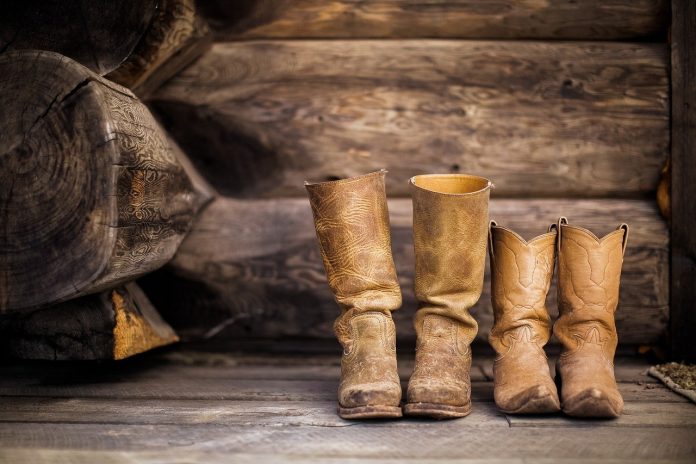“One noon I told Fred that if I had a gun I could shoot some of those pheasants for us to eat, and then his mother wouldn’t have to kill so many chickens to feed us all helping with the haying.
Everybody laughed at me, and Fred said, ‘If you’re going to do any shooting in Colorado, shoot a man. You can always call it self-defense, but if you kill a pheasant you’ll spend the rest of your life in the hoosegow.'”
— Ralph Moody, Little Britches
By Judith Sutherland
When 8-year-old Ralph Moody went from his Colorado ranch to town with his father after two weeks of haying, he had a bit of money of his own to spend. The boy decided to buy a steel trap, just for the fun of trying to catch a prairie dog. When the youngster set and then quickly checked his new trap, he was stunned and scared to find a dead pheasant.
The words of his neighbor Fred echoing in his head, Ralph shivered with fear. This was the wild west in 1906, and even though folks often went hungry, the pheasant was protected in a very clear way. The boy thought about hiding the dead pheasant in the gulch for the coyotes to eat so he wouldn’t have to spend the rest of his life in jail, but he knew his father would be able to read his guilt.
“We went out to milk right after supper. I don’t think I had more than a dozen squirts of milk in the bottom of my bucket — just enough so that it didn’t ring any more — when Father said, ‘What did you do, get your own foot in your trap?'” he wrote.
The young boy admitted to his father what had happened.
The elder Moody thoughtfully said, “It isn’t a case of ‘if the sheriff finds out about it.’ It’s a case of your breaking the law without intending to. If you tried to cover it up, you’d be running from the law. Our prisons are full of men whose first real crime was running away because they didn’t have courage enough to face punishment for a small offense. Tomorrow you must go see the sheriff.”
Sheriff
After a sleepless night filled with great worry, the young boy contemplated saying goodbye forever to his mother and siblings, then dressed and headed for the barn to milk the cow.
“I begged Father to go to Fort Logan with me,” he writes, attempting to convince his father he didn’t know where to find the sheriff.
Boosting his son on to the horse, the father handed him the bagged pheasant, advising him to inquire at the post office. It was a long ride, one in which the child considered running away, though he had no idea where he would go. More than anything, he wanted to be on the farm, working with his father. The post office lady directed Ralph to the Last Chance Saloon.
“At first I thought that would give me a good enough reason to go home without seeing him, because I knew what Mother thought of saloons,” he wrote.
Turning the filly toward home, Ralph then thought of the importance of building boards of character on himself that his Father was always talking about and headed back toward the saloon.
“My heart was thumping like sixty when I went in through the swinging doors. I was scared, but a little bit proud, too, that I had business big enough so that I could go right into a saloon,” Moody writes. As he was introduced to the sheriff, the child said, “I broke the law and Father made me come down to tell you.”
He explained he’d caught the pheasant in a trap accidentally, and the sheriff pulled the pheasant out and ruffled it up all over. “By God, that’s the way he got it all right. I’d a’sworn his old man shot it and sent the kid in to get himself out of a pickle.”
Spirit
Incensed, the boy shouted out in defense of his father’s honor before he could stop himself. The sheriff put the pheasant back in the bag, then laughingly handed it to Ralph, saying he could sure see that the boy thought pretty highly of his father.
“The sheriff said the law was that you couldn’t shoot a pheasant, but he didn’t remember anything in it against catching one in a steel trap, so I’d better take it home for Mother to roast,” he wrote.
The trip home was surely quicker and lighter than the morning ride had been. A few weeks later, recalling how tasty that pheasant was, Ralph mentioned to his father he might set the steel trap near the garden where pheasants were robbing peas from his mother’s crop.
Without hesitation, his father said, “You know, son, a man sometimes has to consider the spirit of the law as well as the actual words.”
Books
I wish every American child would read the Ralph Moody books for so many reasons. Getting a firsthand glimpse of the tough survival instincts required of our early pioneers is only half of the reason.
As Moody’s stories unfold, it becomes clear that tuberculosis is about to rob this family of their beloved, gifted and hard-working father. It is the wisdom and self-discipline imparted while working on the rugged Colorado ranch that helps Moody immeasurably as he steps into mighty big boots.













